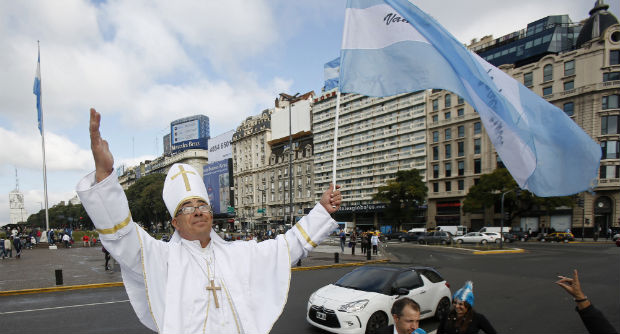
Daniel Francisco Venezia, an Argentina soccer fan dressed as Pope Francis, waves the Argentine flag the morning of the final Brazil World Cup match between Argentina and Germany, in Buenos Aires, Argentina, Sunday, July 13, 2014. AP
BUENOS AIRES, Argentina – Sad-but-proud Argentine soccer fans applauded their national team for giving it all against a powerful German squad, losing 1-0 in extra time Sunday in the country’s first World Cup finals appearance in 24 years.
It was a bittersweet loss and a somber sense of resignation quickly turned into a celebration of the team’s gutsy performance. Thousands dressed in Argentina’s blue-and-white colors poured into downtown Buenos Aires, surrounding the city’s iconic Obelisk where fans traditionally gather to celebrate victory, not defeat.
Cars honked staccato rhythms, firecrackers were tossed into the air and fans of all ages jumped in place shouting “Argentina! Argentina! Argentina!” with barely a tear in sight.
“We have nothing to regret, we played first rate,” said 53-year-old Horacio Laseiras, carrying his six-year-old daughter on his shoulders.
The two-time world champion entered the title match as the clear underdog after Germany’s 7-1 thrashing of host Brazil. But despite complaints about lackluster play earlier in the tournament, the team led by captain Lionel Messi showed grit throughout the match, creating several opportunities to score in the first 90 minutes.
Amid the outpouring of gratitude, there was a hint of frustration that Messi, the four-time world player of the year, didn’t turn in a stronger performance.
“Messi still isn’t Maradona,” said 31-year-old Eduardo Rodriguez, referring to Diego Maradona, who lifted the championship trophy for Argentina in 1986 and led the ‘albiceleste’ to its last World Cup final, also against Germany, in 1990. “But this here is a party. We’re all proud of our warriors.”
Businesses had shut down ahead of Sunday’s game and Argentines had stocked up on meat to enjoy the game with a traditional asado, or barbeque. Giant posters with a smiling Messi seemed to greet passers-by on almost every corner of Buenos Aires.
A crowd of about 20,000 people filled the capital’s Plaza San Martin to watch the match on a giant screen, climbing atop lamp posts to get a better view and shouting every time the team entered German area.
“I feel an enormous sadness,” 19-year-old Soledad Canelas, carrying a blue-and-white Argentine flag, said after the game. “I had the illusion of seeing Argentina become champion for the first time in my life.”
The shot at the title united Argentines otherwise exasperated by one of the world’s highest inflation rates, an encroaching debt crisis and a corruption scandal that has penetrated deep into President Cristina Fernandez’s inner circle.
Fernandez, whose approval rating has plunged in recent months, kept a low profile during the tournament. She declined an invitation to attend the final, preferring instead to rest ahead of a summit Tuesday, also in Brazil, with leaders from Brazil, Russia, India and China.
But despite the pride over their team’s performance, many Argentines couldn’t hide the pain.
In Rio de Janeiro, more than 70,000 Argentina fans cheered on their team, many having traveled upward of 40 hours by car and seemingly all wearing their team’s sky-blue jerseys and chanting day and night.
“This was a trauma. We were going to be able to leave singing songs in victory with the glory of the Cup,” said Joao Cuenca, who has an Argentine father and a Brazilian mother. “What happened is nothing short of a disaster.”

